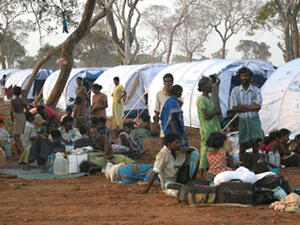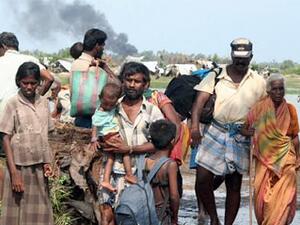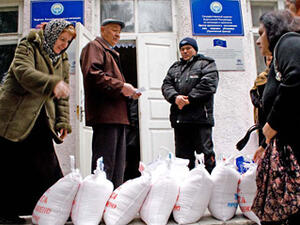UN team enters deserted and devastated Liberian town
UN team enters deserted and devastated Liberian town
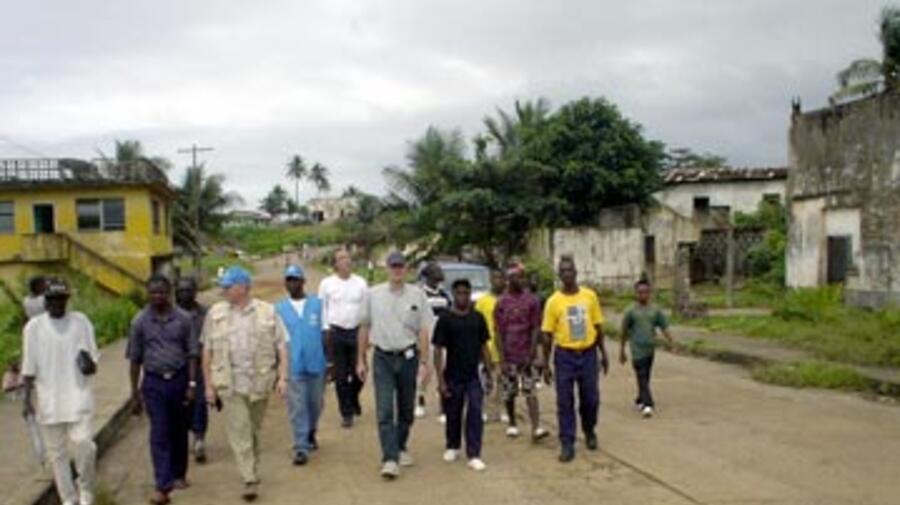
The UN team walks through the deserted streets of the southern Liberian port of Harper.
HARPER, Liberia, Sept 15 (UNHCR) - A UN team, including two UN refugee agency staff, managed to enter the southern Liberian port of Harper at the weekend - the first such visit for six months - and reported that it has suffered extensive looting and is largely deserted. The team, investigating reports that hungry people from Harper and elsewhere are roaming the nearby border areas in search of food and safety, found a mixed picture as they proceeded further inland.
"Harper is practically deserted," said Jo Hegenauer, UNHCR's Senior Emergency Officer who was part of the 15-member team, from six different organizations, including UNHCR. "We estimated that fewer than 700 people are currently living in the town. Almost everyone is a male between the ages of 15 and 50. The few women we saw were businesswomen selling goods from Ivory Coast."
The team arrived off Harper on Saturday after a 20-hour voyage from the Liberian capital, Monrovia, on board a World Food Programme ship, but then had to wait seven more hours for a high tide before they were able to dock.
On Sunday, the team began exploring the town on foot, and found evidence of widespread looting and destruction - and very few inhabitants. UNHCR's office was a typical example of the wave of looting that has devastated the once prosperous town: only the walls remain.
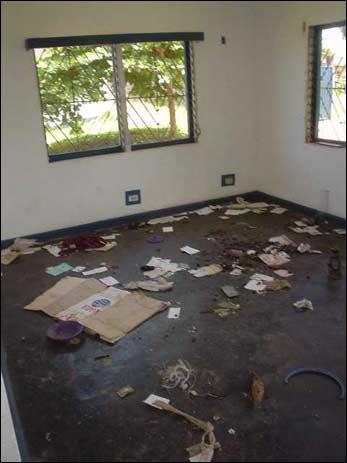
Most buildings in Harper, including the UNHCR office, were stripped of all their contents, in some cases including even the windows and doors and underground water pipes.
"Everything else is gone," says Hegenauer. "Windows, doorknobs, furniture, telecommunications equipment, even toilets and sinks were taken." The generator was also dismantled and a UNHCR truck, in the backyard, was stripped of virtually all moveable parts.
The team also visited the Harper Transit Centre, one of three UNHCR sites in the area, and found only about 500 people there, including 200 Liberian returnees wanting to return to Lofa, about 150 displaced Liberians, 100 other West Africans and 50 Ivorian refugees. At one point, the Harper Transit Centre held more than 5,000 people. According to their leaders, many more refugees and returnees are on the border and would return to Harper if food distribution were to restart.
On Monday, the team encountered a mixed picture as they probed further inland and along the border with Côte d'Ivoire.
Pleebo Transit Centre, just to the north of Harper was completely empty. However, the nearby border town of Pleebo, was bustling with life - full of Liberian returnees, women and children. People were travelling in canoes back and forth across the river that marks the border with Côte d'Ivoire, importing food and other goods.
People in the canoes and on the far bank waved at the UN team, apparently very happy to see the UN back in the region.
"Everyone was excited to see us there," said Hegenauer. "Basically they were hoping we can help them go home, whether they are Liberians, Ivorians, Malians or Nigerians."
The team also visited Fish Town, the third site for refugees and returnees in this part of Liberia. Around 2,700 people are currently in the camp there, including 1,200 displaced Liberians, over 800 Ivorian refugees, 500 Liberian returnees and 360 people from other countries. The camp remained intact throughout the fighting and - possibly because it is small and simple, with not much to loot apart from wooden poles and plastic sheeting.
In general, the security situation seemed relatively good both in Harper itself and in the surrounding region, and local commanders belonging to MODEL (Movement for Democracy in Liberia), assured the team they could and would guarantee the safety of staff, as well as ensure access to all areas under their control.
UNHCR pulled out of Harper in March, when fighting between government troops and MODEL, a newly formed rebel group, engulfed the town. After the death of three NGO workers, following an attack in Toe Town, further to the north, on February 28, fighting quickly spread through the whole eastern part of Liberia, forcing humanitarian agencies to suspend their activities there. UNHCR had three offices in eastern Liberia and was assisting some 38,000 Ivorian refugees, 45,000 Liberians returnees and around 15,000 other West African nationals, all of whom had fled the conflict in neighbouring Côte d'Ivoire.
Meanwhile closer to Monrovia, UNHCR at the weekend started assisting the return of over 2,300 displaced Liberians who had fled Totota toward the capital two weeks ago. The displaced were taken in three trucks from Salala, which is on the road to Monrovia, back to their displaced camps in Totota. UNHCR staff reported that, thanks to increased security and ECOMIL patrols, the camps in Totota, which used to house 51,000 people, had regained 90 percent of their populations.





